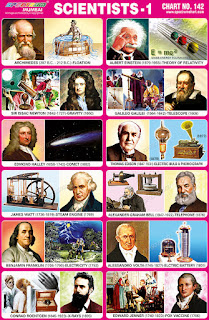 |
| Scientists Chart |
Spectrum Chart - 142 : Scientists 1
- Archimedes - Archimedes was an Ancient Greek mathematician, physicist, engineer, inventor and astronomer. He developed the "Principle of Floatation". On Floating Bodies Archimedes stated "When a body is wholly or partially immersed in a fluid there is an upthrust which is equal to the weight of fluid displaced". This is Principle of Floatation also known as Archimedes Principle.
- Albert Einstein - Albert Einstein was a German-born theoretical physicist who developed the general theory of relativity, one of the two pillars of modern physics. Einstein is well known for his theories about light, matter, gravity, space and time. His most well known equation is E = mc2 . It means that energy and mass are different forms of the same thing. His theories of special and general relativity are of great importance to many branches of physics and astronomy. He received the Nobel Prize in Physics in 1921.
- Sir Issac Newton – Sir Isaac Newton was an English physicist and mathematician. He is famous for his work on the laws of motion, optics, gravity and calculus. Sir Isaac Newton was the first to discover the laws of gravitation and the laws of motion. Newton built the first practical reflecting telescope and developed a theory of colour based on the observation that a prism decomposes white light into the many colours of the visible spectrum.
- Galileo Galilei - Galileo Galilei was an Italian astronomer, physicist, engineer, philosopher, and mathematician who played a major role in the scientific revolution. Galileo has been called the "father of observational astronomy",the "father of modern physics" and the "father of science".
- Edmond Halley – Edmond Halley, was an English astronomer, geophysicist, mathematician, meteorologist and physicist who is best known for computing the orbit of the Halley's Comet. Halley spent most of his time on lunar observations.
- Thomas Edison - Thomas Alva Edison was an American inventor and businessman. He developed many devices that greatly influenced life around the world, including the phonograph (later known as grahamophone), the motion picture camera and the long-lasting, practical electric light bulb. Edison was a prolific inventor, holding 1,093 US patents in his name, as well as many patents in the United Kingdom, France and Germany.
- James Watt - James Watt was a Scottish inventor, mechanical engineer, and chemist whose Watt steam engine, an improvement of the Newcomen steam engine, was fundamental to the changes brought by the Industrial Revolution in both his native Great Britain and the rest of the world. He also developed the concept of horsepower and the SI unit of power, the watt, was named after him.
- Alexander Graham Bell - Alexander Graham Bell was a Scottish-born scientist, inventor, engineer and innovator who is credited with patenting the first practical telephone in 1876. Bell's later life, included groundbreaking work in optical telecommunications, hydrofoils and aeronautics. He is also credited with developing one of the early versions of a metal detector in 1881.
- Benjamin Franklin - Benjamin Franklin was an American statesman and scientist. Franklin was a scientist who studied experiments in an effort to improve or correct them. One of his greatest contributions was in the theory of electricity. Most people see Franklin as one of history's greatest inventors. He invented the lightning rod, bifocals and the Franklin stove, among other things.
- Alessandro Volta - Alessandro Volta was an Italian physicist, chemist and a pioneer of electricity and power, who is credited as the inventor of the electrical battery and the discoverer of methane. The SI unit of electric potential is named in his honour as the volt.
- Conrad Roentgen - Conrad Rontgen was a German engineer and physicist, who, on 8 November 1895, produced & detected electromagnetic radiation in a wavelength range known as X-rays or Röntgen rays, an achievement that earned him the first Nobel Prize in Physics in 1901.
- Edward Jenner - Edward Jenner, was an English physician and scientist who was the pioneer of smallpox vaccine, the world's first vaccine. He is often called "the father of immunology", and his work is said to have "saved more lives than the work of any other human".

No comments:
Post a Comment